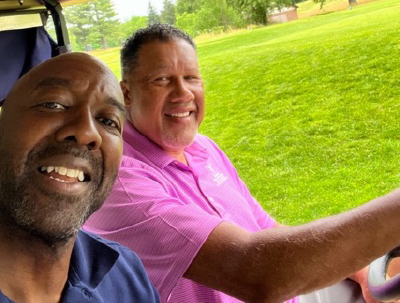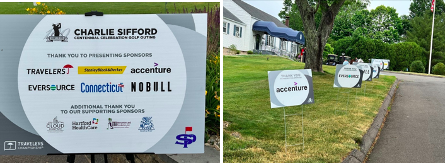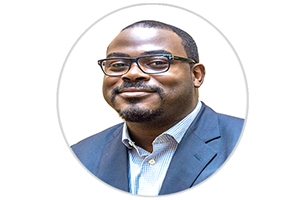
What does change look like? It can be something small like taking a safer route to work. It can also be something big like tearing down a barrier that stands between you and your dream—and in so doing guiding the path for the next generation.
It is the latter that we see in the story of Dr. Charlie Sifford, a professional golfer and the first African American to play on the PGA Tour. He was a champion that changed the game, and he inspired generations of African American golfers, including another African American PGA legend who would name his son Charlie Woods in honor of Dr. Sifford.
To paraphrase Marcus Garvey, you cannot erect a solid tree without roots. We can more fully appreciate Dr. Sifford’s contributions by recognizing the contributions of those African American golfers who came before him and the historic context in which he would learn and play the game.
The champions of change in American golf
1896: John Shippen was an early African American golfer and the first American golf professional, having taught notable figures such as John D. Rockefeller and J.P. Morgan. He also played in the second US Open.
1899: Dr. George Grant, the second Black graduate of Harvard’s Dental school, patented the golf tee.
1926: the United Golfers Association (UGA), started by George Adams and Robert Hawkins, was an independent tournament for African American golfers.
Dewy Brown made history as the first African American PGA professional. When members of the PGA discovered his racial identity in 1934, they instituted the Caucasian-Only Clause, which prevented other races from playing. This did not stop Brown or other Black golfers from competing. In fact, the UGA became a hub for Black golfers. Among them was Dr. Sifford.
In 1961, the Caucasian-Only Clause was terminated, and Dr. Sifford became the first Black golfer on the PGA Tour. In breaking this color barrier he experienced bigotry similar to what Jackie Robinson experienced in breaking the color barrier in Major League Baseball.
President Barak Obama told Dr. Sifford’s story at the White House in 2014 as he was awarded the Presidential Medal of Freedom—the highest civilian honor our nation can bestow. Dr. Sifford passed the following year.
Inspiring change on and off the course
2022 was Dr. Sifford’s centennial year, and the Travelers Championship hosted the Charlie Sifford Centennial Celebration Golf Outing. This event honored Dr. Sifford’s memory, his contributions to the game of golf, and raised $100,000 for the Dr. Charles L. Sifford Scholarship. The funds help cover college tuition for HBCU students or minority students pursuing a career in golf management.
Tony Steadman, a managing director and client account lead within Accenture’s insurance practice, played in the Sifford golf outing. Like Dr. Sifford, Tony is a change maker with a passion for breaking down barriers for young Black professionals.
Tony grew up in South Carolina—from “the other side of the tracks” as he describes it. He was academically talented and driven to pursue a career in financial services. However, he was initially apprehensive about taking up golf.
Like many of our grandfathers, Tony’s grandfather watched golf on TV. Tony knew of golfers like Calvin Peete. He later learned about Dr. Sifford and recalls the story as bittersweet. “The fact that someone could endure so much hardship and still come out successful was inspiring,” Tony says, “but at the same time it was difficult to hear about the disgusting things that were done to him.” Tony recalls painful incidents Dr. Sifford endured like having fecal matter left in the cup where he had to retrieve his ball.
In the business world Tony also faced bigotry; sometimes subtle, other times overt. Eventually, Tony came to the game of golf through his corporate work. He realized the many benefits the game offered and the friends to be made while playing. Moving to Atlanta gave Tony the opportunity to connect with other golfers through his fraternity—The Ques. This helped him get back into the game after not picking up a golf club for two years.
Golf would become an important part of Tony’s career journey. When he joined Accenture in 2021, the pandemic was still keeping many people apart. The game was a conduit to relationship building. He played 36 holes during his first week with Accenture affording opportunity to safely meet with others outdoors and make the onboarding much smoother and more enjoyable.
In 2022, Tony and other leaders in the insurance industry founded the Black Insurance Industry Collective (BIIC). This organization includes major insurance carriers and trade organizations and the University of Virginia’s Darden School of Business. Together, they support and accelerate the advancement of Black insurance professionals and increase industry representation of Black managers, leaders and executives.

“We want to offer the next generation of Black insurance professionals a career path and the skills needed to overcome the challenges that too often drive Black talent out of insurance and into other industries,” Tony says. “Accenture and other founding sponsors of the BIIC are walking the talk on workforce diversity and inclusion. We will see change in the industry and in the lives of customers as a result.”
Being the change we want to see
While playing golf, Tony says there are not many people who look like him on the course. He notes there are still improvements to be made. To Tony, Dr. Sifford’s story is the embodiment of “Be the Change” and that, yes, golf is for us too.
Whether in an organization, an industry or a culture, change can be made by constructing phases that spread out over time. These changes are often necessary for the survival of the institution and its relevance to the next generation.
Critical in that change is representation. Stories like Tony’s and Dr. Sifford’s need to be told if we are to change perceptions about golf and continue tearing down barriers for young African Americans.

